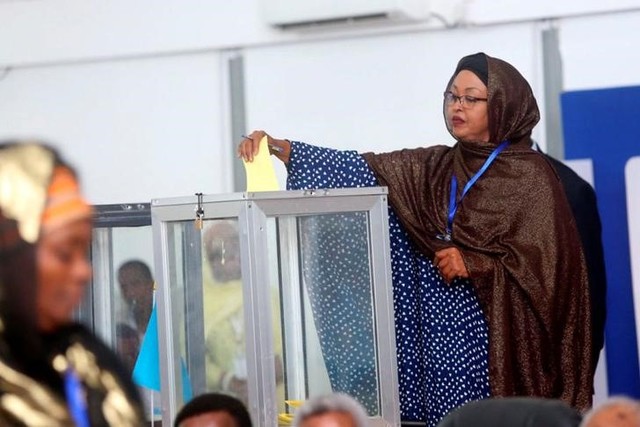Over 80,000 voters to elect MPs in new electoral model

By T. Roble
Somalia is adopting an enhanced version of the 2016 electoral model with an increased number of electoral delegates tripled for every MP and the role of elders in the process further whittled down.
A meeting led by President Mohamed Farmaajo in Dhusamareb announced Friday it had reached the compromise deal but the agreement has to be ratified by the Lower House of Parliament according to a communique from the talks.
Key regional states-Jubbaland and Puntland have however dismissed the proposal terming it a ‘personal opinion’ of the leaders present. Galmudug, HirShabelle, South West states attended the talks in addition to Banaadir Regional Administration.
THE FORMULA
The Dhusamareb Model mirrors the same one adopted by the National Leadership Forum (NLF) in 2016 during the term of then presdent Hassan Sheikh Mohamud. It envisages the selection of 301 delegates to who will vote for a single MP which shall translate to a total of 82, 775 voters.
During the 2016 process, an MP was elected by 51 delegates adding up to a total of 14, 025. MPs representing Somaliland clans were elected by select delegates in Mogadishu. The 2020 model maintains a similar approach for Somaliland. The communique noted the case for Somaliland shall be ‘indirect’ taking into consideration its place within the Somalia political and governance structure.
Unlike the 2016 model, the Dhusamareb Model further reduces the role of elders in the selection of delegates. The 301 delegates will be selected jointly by the clan elders and civil society representatives. This is a progressive model since 2012 when elders solely elected MPs while in 2016 they chose delegates who subsequently elected the lawmakers.
SELECTION OF SENATORS
The Dhusamareb Model retains the 2016 Enhanced Legitimacy Model in election of the 54 Senators. Federal Member State parliaments will choose the respective Senators.
The 2016 Model distributed the Senate seats among the FMS and Somaliland equally save for Somaliland and Puntland both of which were allotted 11 seats. Galmudug, Jubbaland, South West and HirShabelle were each allotted eight seats.
POLLING STATIONS
In a move to promote a more inclusive and devolved electoral process, the Dhusamareb Model sets a minimum of four polling stations in every Federal Member State different from the 2016 Model which set the FMS capitals as the polling stations. With this formula, sub-clans will aggregate their ballot boxes so that voting will be conducted in the same day countrywide unlike in 2016 when the process was staggered for up to three months.
One of the reasons the voting in 2016 took such a long time was the slowed process of selecting delegates which was marred by corruption and disputes within sub-clans on the selection of the delegates.
The electoral commission (NIEC) will this time gave a role unlike in 2016 when its role was assumed by the Federal Indirect Elections Team (FIET). Together with the FMS elections boards, NIEC will run the upcoming elections.
According to the communique, the Model shall be subjected to approval by the Lower House, a move that has been questioned by analysts as it locks out the Upper House.
The director of Mogadishu based Heritage Institute for Policy Studies (HIPS) noted it was imperative to seek a buy-in from Jubbaland and Puntland before taking the document o parliament.
“The electoral model agreed by President Mohamed Farmaajo and the three regional leaders is a good start BUT it needs the support of Puntland, Jubbaland, political parties and civil society; before they held signing ceremony, they should’ve taken the draft model to Kismaayo, Garowe and Mogadishu,” said Hashi in a tweet.
He also faulted the move to sideline the Upper House in the process noting it (Upper House) was an integral part of the process.
“Article 55 of the Constitution states: The Federal Parliament of the Federal Republic of Somalia consists of (a) The House of the People and (b) The Upper House. A Joint session of both chambers should approve the next electoral model. Undermining the Upper House should END.”